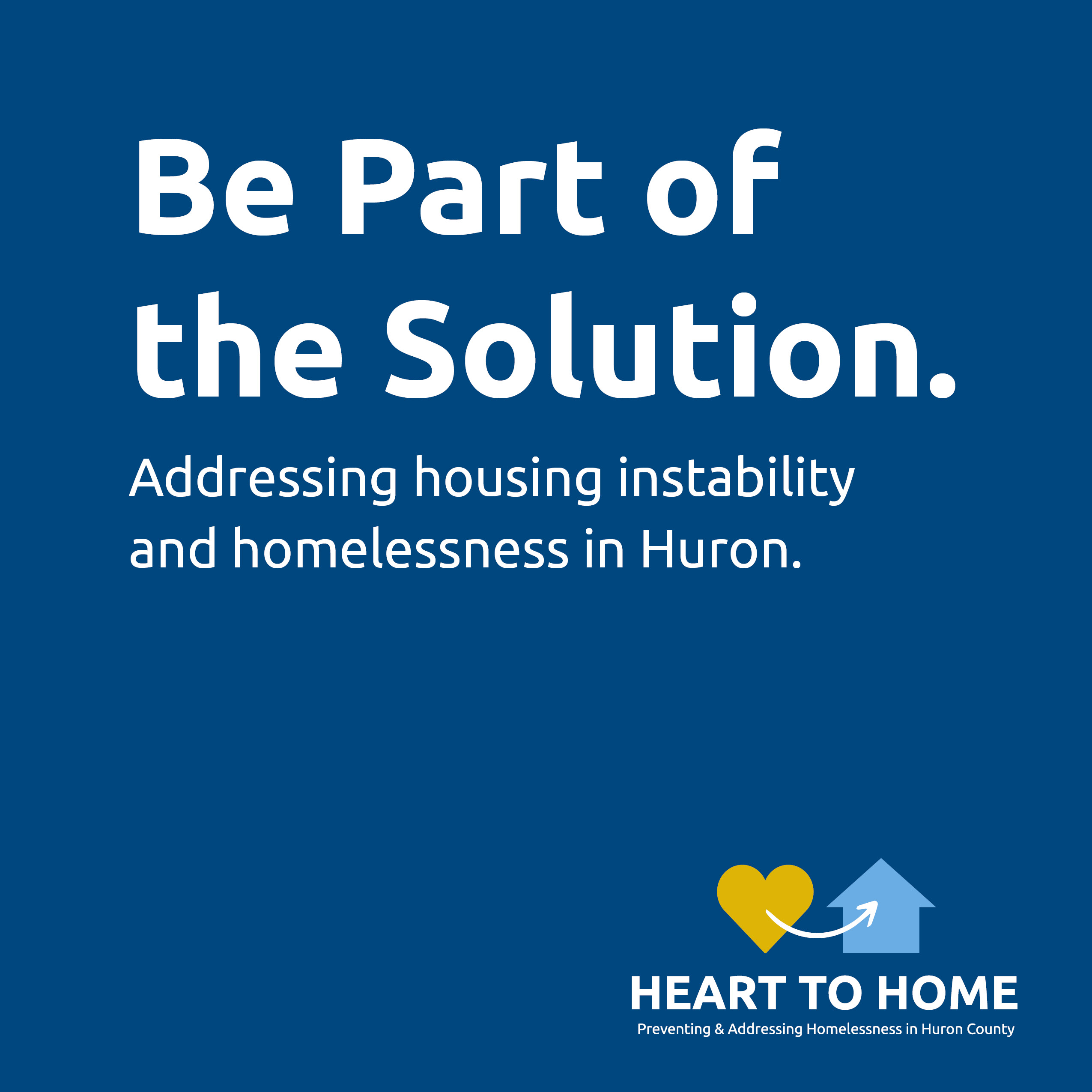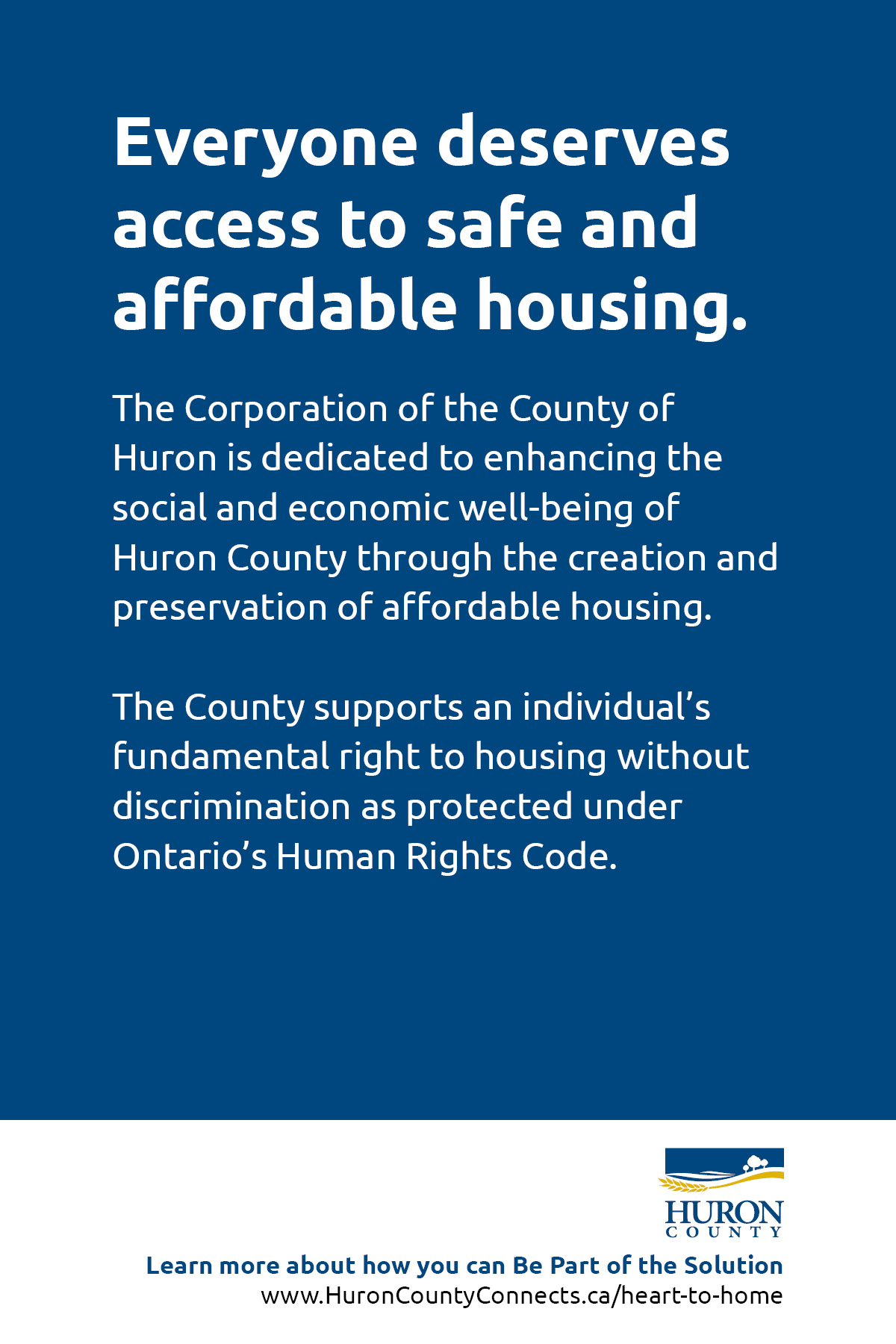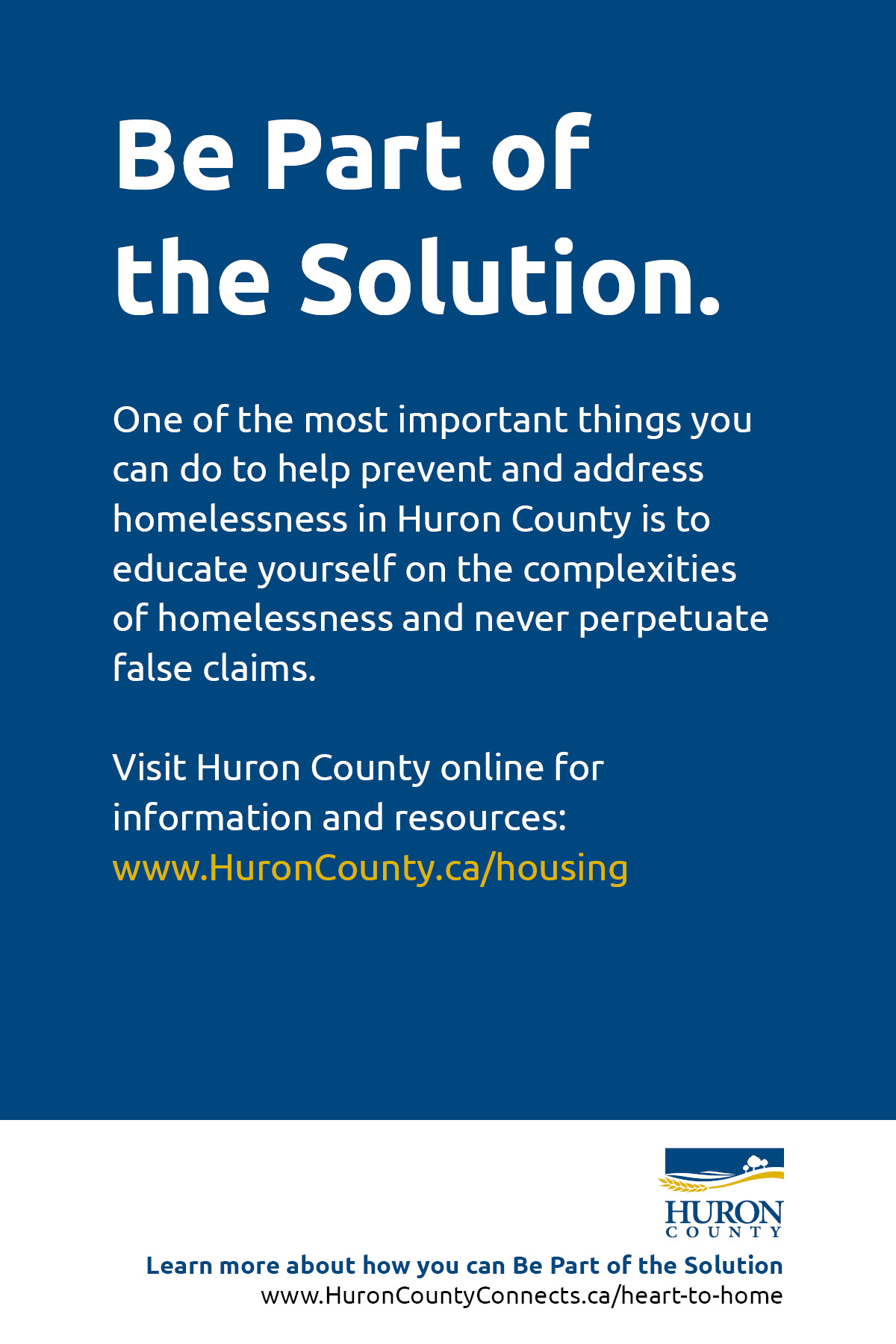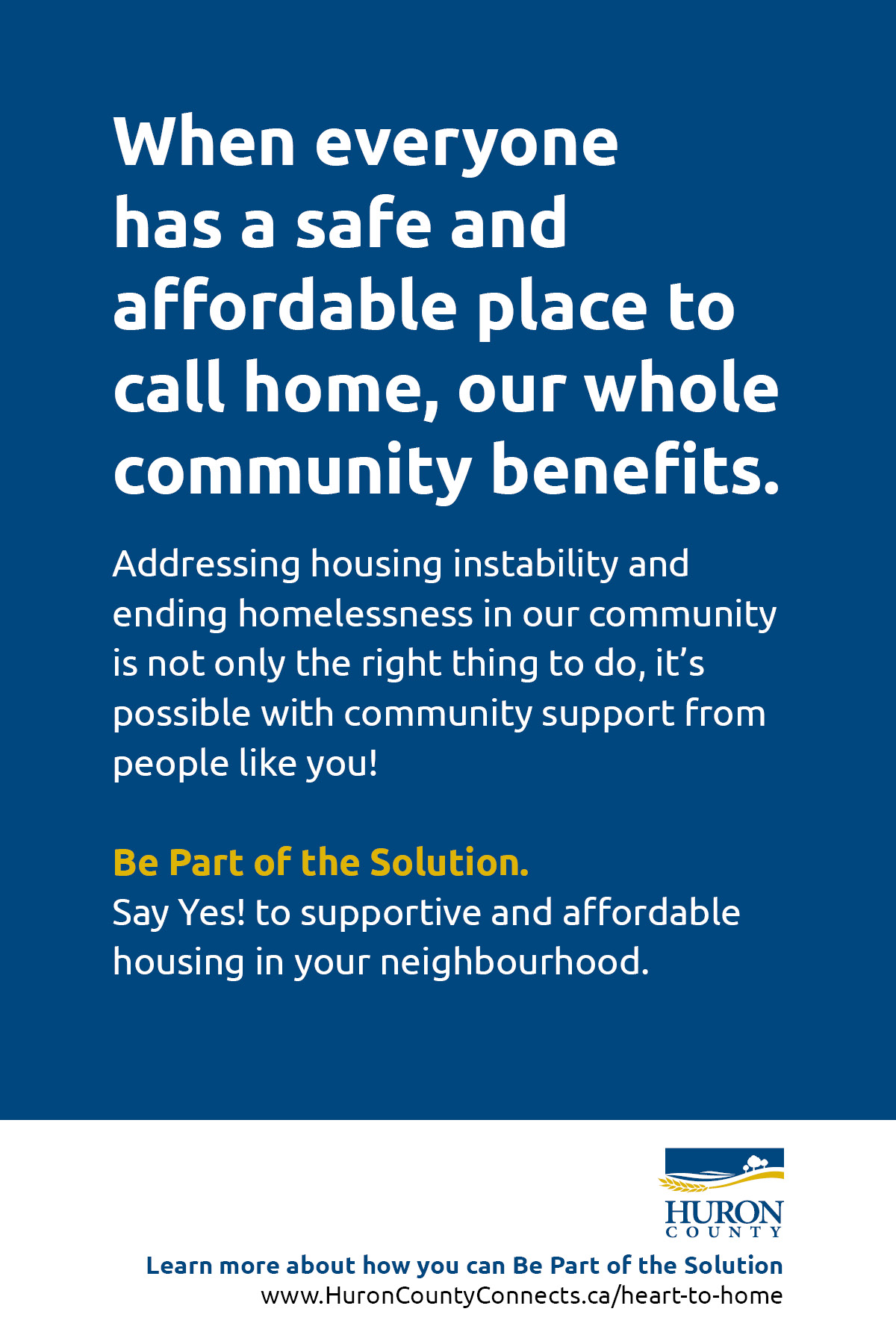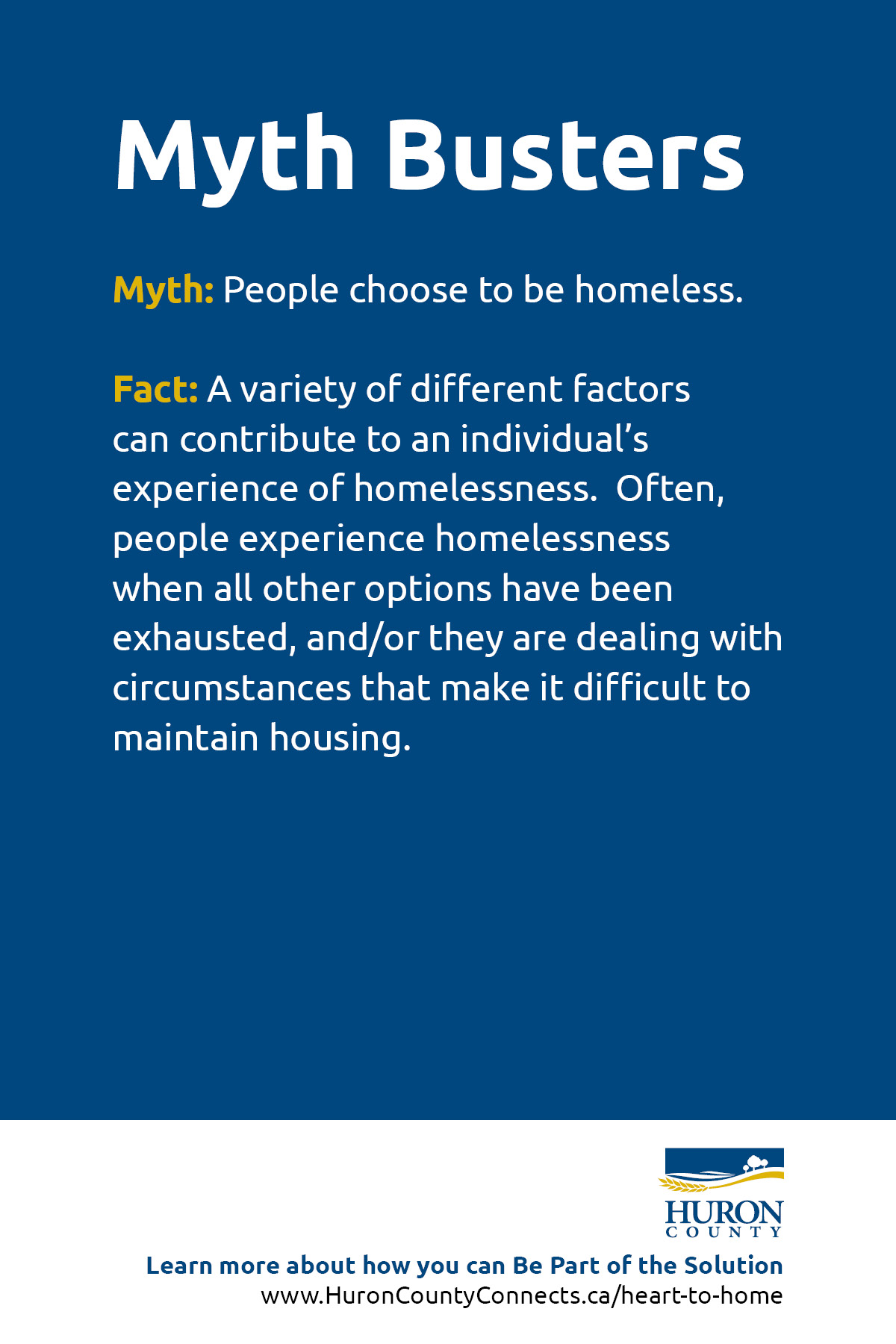Preventing and Addressing Homelessness in Huron County
People experiencing homelessness and those at high risk of becoming homeless have their own experiences and challenges that require an individualized response. Responding to homelessness is not just about providing housing, it requires relationship and trust building and often means addressing complex issues including past traumas, mental illness, or substance use.
For these reasons, addressing homelessness requires an integrated system of support and care strategies that are provided by multiple organizations and agencies working together using a Housing First strategy, the primary goal of Huron Heart to Home.
Huron Heart to Home is comprised of County of Huron staff who work with many community partners to prevent and address homelessness in Huron County. These staff connect people to community, local organizations, and resources that can help a person access long-term housing.
Be Part of the Solution
What is Homelessness?
The Canadian Definition of homelessness is: The situation of an individual, family, or community without stable, safe, permanent, appropriate housing, or the immediate prospect means and ability of acquiring it.
An individual may be homeless if they are:
- Unsheltered. Living on the streets or in places not intended for people to live in.
- Emergency Sheltered. Staying in overnight shelters for people who are homeless. This includes shelters for those affected by family violence.
- Provisionally Accommodated (Couch Surfing). This refers to those whose accommodation is temporary or borrowed.
What we're doing to Be Part of the Solution
The Stability Team
The Stability Team are specially trained staff who work directly with people in crisis. These caring professionals help connect people who are homeless, or who are at risk of becoming homeless, with the various services and supports they require such as a safe place to sleep, food, warm clothing, access to healthcare services, and more.
Temporary and Transitional Housing
The County of Huron partners with multiple organizations to provide temporary housing for those in crisis as well two transitional housing programs: Huron Turning Point Residence and Addiction Supportive Housing (ASH).
By-Name List
The By-Name List allows individuals in crisis to self-identify and communicate their unique needs to those who can help. Through this information collection process, staff become better aware of who and how many people in our community need supportive services.
Coordinated Access System
Utilizing the data collected from the By-Name List, County of Huron staff lead the Huron County Homelessness Coordinated Access System. This system ensures that local organizations can better work together to effectively address the specific needs of those experiencing homelessness within the community. The County of Huron worked with Built for Zero to achieve a Quality By-Name List and Coordinated Access program.
Communications
There are many myths and falsehoods about homelessness. The County of Huron’s Communications Team makes sure that people in Huron County have access to facts, data, and learning resources that help with understanding. They also ensure that the community is well informed on the various activities and programs designed to prevent and address homelessness in their community.
Prevention Programs
The County of Huron runs many programs that are designed to prevent people from becoming homeless, such as Pathways to Self Sufficiency. Other programs include owning and operating 415 rent-geared-to-income apartment units, as well as a variety of programs for both landlords and tenants.
Financial Support
Sometimes the best way to stop a person from becoming homeless is to support them with funds that help them pay for the things they need so that they can continue to afford to live in their current home. The County of Huron works with other levels of government to deliver financial aid programs, such as housing allowances, rent supplements, Ontario Works, and the Canada Ontario Housing Benefit.
Housing Developments
The County of Huron is increasing its affordable housing inventory through the development of new affordable housing developments.
Future Planning
The County of Huron’s Planning and Development department is addressing the community’s need for more affordable housing by promoting and permitting more dense housing developments. For example, Additional Residential Units are permitted to be added to existing residential properties; this helps to create units which are more affordable.
How you can help to Be Part of the Solution
Become informed and don’t spread false information.
There are many myths and falsehoods around the topic of homelessness and how people can become homeless. Learning more about homelessness and housing instability can help increase understanding. Explore the resources found at the end of this page for more information.
Speak up! Advocate for those experiencing homelessness, hurt and hunger in your community.
Sadly, people facing homelessness are often subject to various forms of discrimination. Poverty, physical and mental health, and substance use concerns are not reasons to deny a person’s fundamental right to housing without discrimination as protected under Ontario’s Human Rights Code.
If you hear inflammatory language or witness discriminatory actions, speak up! Advocate for those in the community who may be more vulnerable. If you’re unsure if a statement is valid or discriminatory, try taking the cringe test, found on HuronCounty.ca/housing
Welcome Supportive and Affordable Housing in your community.
To Be Part of the Solution it is essential to welcome affordable housing developments in your own neighbourhood. It takes an entire community, including multiple levels of government, many stakeholders, neighbourhoods, and the public to create a welcoming atmosphere for housing that improves life for everyone in our community.
Consider donating locally.
Consider donating to a local agency that’s meaningful to you and supports our community’s most vulnerable citizens, such as emergency shelters, food banks, clothing drop offs, and more.
Participate in local events that support vulnerable people.
Events like The Coldest Night of the Year are a great way to get involved. The Coldest Night of the Year is a fun, family-friendly fundraising walk that supports local non profit partners who provide essential care and service for people experiencing homelessness, hurt, and hunger. Learn more: www.cnoy.org
Homelessness Prevention Programs
The County of Huron manages and/or financially aids many homelessness prevention initiatives in Huron County. Some of these programs include:
Addiction Supportive Housing (ASH)
ASH is a transitional housing program for eight individuals working directly with Choices for Change (Alcohol, Drug and Gambling Counseling Centre).
Pathways to Self-Sufficiency
Pathways to Self-Sufficiency provides rental and utility arrears funding to low-income households experiencing potential eviction and/or utility disconnection.
Safe Homes for Youth
Funding was provided to Safe Homes for Youth to assist in the supports and shelter for youth facing homelessness.
Housing Allowances
This long-term support provides $250 each month directly to low-income households to help with rental and/or utility costs.
Rent Supplement
A monthly fee paid directly to landlords who enter into a formal agreement with the County.
Housing Stability Worker
This full-time County position provides support work for homelessness prevention, and provides referrals to social agencies, financial assistance, and more
Be Part of the Solution
The County of Huron is working with many community partners to address housing instability and homelessness in Huron. Learn more about the actions we’re taking in the Be Part of the Solution brochure.
By-Name List
What is the By-Name List?
A By-Name List is a centralized list of all the people experiencing homelessness in a community.
Huron’s By-Name List is managed by County of Huron Social and Property Service staff and is regularly maintained by many community organizations. It provides real-time data on those experiencing homelessness in the community at any given time.
Through this data collection process, staff become more aware of who and how many people in our community need supportive services. The process enables homelessness to be tracked to see if it is growing or shrinking over time.
How a By-Name List Helps Communities End Homelessness
Huron County is Built for Zero Community that has achieved a Quality By-Name List from the Canadian Alliance to End Homelessness.
Why do we need a By-Name List?
The information on the By-Name List helps social service staff triage services. By using the information on the list, the right services can be offered to the people who need it most, first.
Who can be added to the By-Name List?
Anyone can refer themselves to the By-Name List.
What happens when I am added to the By-Name List?
When you are added to the By-Name List, you may be asked to disclose personal information, such as:
- Your current location;
- Age and gender;
- Family status (single, married, with children etc);
- Any health concerns, including addiction or mental health;
- If you currently have access to temporary shelter;
- For how long, or how often you have experienced homelessness;
- And more.
All information on the By-Name List is completely confidential.
How can I be added to the By-Name List?
To be added to the By-Name List, call 519.482.8505 Ext. 2299
Offices are open from Monday to Friday from 8:30 a.m. to 4:30 p.m.
Myth Busters
There is a great deal of stigma and misinformation surrounding issues of homelessness. You can Be Part of the Solution by becoming informed and not perpetuating false claims.
Myth: People choose to be homeless
Fact: A variety of different factors can contribute to an individual’s experience of homelessness. Often, people experience homelessness when all other options have been exhausted, and/or they are dealing with circumstances that make it difficult to maintain housing.
Myth: People experiencing homelessness are lazy
Fact: In order to survive, many people who experience homelessness are constantly in search for the necessities of life, such as food, shelter and a source of income. Therefore, due to the barriers that they face, many people experiencing homelessness do not have the option of being stagnant or lazy.
Myth: All people who experience homelessness are addicts
Fact: Many people who experience homelessness do not struggle with substance abuse problems. Just like in the general population, only a percentage of those who are experiencing homelessness deal with substance use. People experiencing homelessness may deal with other complexities related to their experiences of homelessness, including trauma and mental illness, for example.
Myth: People experiencing homelssness should just find a job
Fact: There are already people experiencing homelessness who are employed; however, it is much more difficult to find a job while experiencing homelessness. A number of different challenges, such as: lacking a permanent address, not having regular access to showers, barriers to transportation, and other difficulties like mental illness, make it difficult to obtain employment. Even when individuals experiencing homelessness find jobs, they are often part-time or minimum wage positions. This work fails to adequately meet their needs, due to expensive housing costs.
Myth: There are many services and supports to help those experiencing homelessness
Fact: Many of the solutions and supports for homelessness have focused on emergency services, such as shelters and food banks. For individuals who are trying to escape a cycle of poverty and homelessness, emergency services alone are not adequate. There is a need to focus on the larger systemic factors, including the lack of affordable housing and the criminalization of homelessness that prevent people from obtaining permanent and suitable shelter.
Resources
Temporary Sheltering
Huron’s Temporary Sheltering program is managed in a partnership with the County of Huron and Canadian Mental Health Association, Huron Perth Addictions and Mental Health Services.
For information on this sheltering option call 519-525-5922.
Learn more about the topic of homelessness
2022 Housing and Homelessness Annual Report
https://www.huroncounty.ca/wp-content/uploads/2023/06/2022_Housing_and_Homelessness_Annual_Report.pdf
2021 Enumeration Report
https://www.huroncounty.ca/wp-content/uploads/2022/02/EveryoneCounts_2021Enumeration.pdf
2021 Report to the Community on Homelessness Infographic
huroncounty.ca/wp-content/uploads/2021/11/Report-to-the-Community.pdf
Perth-Huron United Way: Unignorable
perthhuron.unitedway.ca/unignorable-issues/#unignorable-homelessness
Ontario Housing Strategy
Canadian Alliance to End Homelessness
Built For Zero
The Homelessness Hub
Homelessness 101
homelesshub.ca/about-homelessness/homelessness-101/causes-homelessness
Documents and Reports
Housing Study Reports
Long-term Affordable Housing Plan
Long Term Affordable Housing & Homelessness Plan – Update
Long-Term Affordable Housing & Homelessness Plan
Annual Reports
2023 Housing and Homelessness Annual Report
2022 Housing and Homelessness Annual Report
2021 Housing and Homelessness Annual Report
2020 Housing and Homelessness Annual Report
2019 Housing and Homelessness Annual Report
2018 Housing and Homelessness Annual Report
2017 Housing and Homelessness Annual Report
2016 Housing and Homelessness Annual Plan Report
2015 Annual Housing and Homelessness Plan Report
2014 Annual Housing and Homelessness Plan Report
Enumeration
211
211 is a helpline that easily connects people to the social services, programs, and community supports they need.
Dial 211 or visit www.211ontario.ca
The Corporation of the County of Huron is dedicated to enhancing the social and economic well-being of Huron County through the creation and preservation of affordable housing.
The County supports an individual’s fundamental right to housing without discrimination as protected under Ontario’s Human Rights Code.


